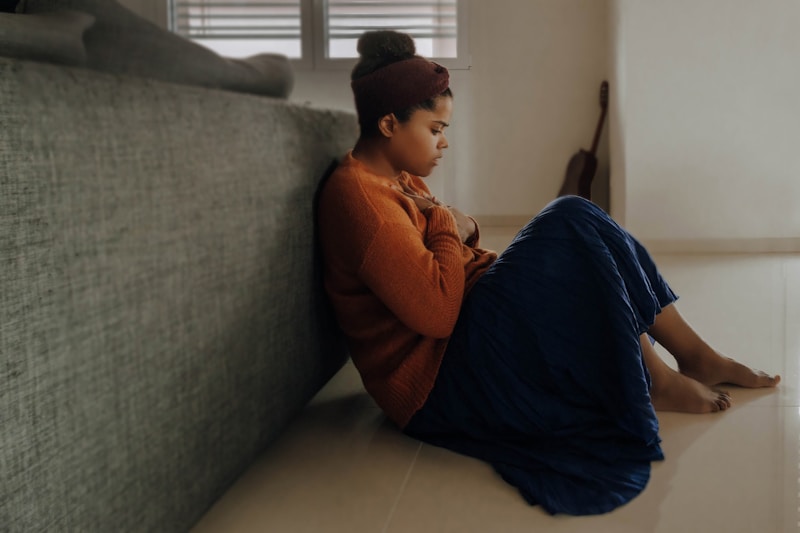Anxiety sucks. It dries out my mouth, it gives me stomach cramps and it makes me SO irritable. Anxiety affects us all differently and for different reasons, but the common denominator in this tale is, we all suffer from anxiety.
What Does Anxiety Look Like?
Unlike the stresses that we deal with everyday, anxiety is something that builds and persists, often making a situation far worse than it really is. If we don’t manage our anxiety, it can prevent us from experiencing life in the present moment, and cause our bodies to enter a hyper-alert, flight or fight mode. This can take a toll on our bodies and our brains, and in my experience, it isn’t fun. There are a large number of physical and psychological symptoms that you might relate to:
Physical Symptoms:
|
Psychological symptoms:
|
In my experience with anxiety, it hits my digestive system first and my hair growth second. If my stress levels go unmanaged, my tummy and eating habits will become a little erratic. At its worst… my hair starts to fall out. Yes, you heard me, anxiety causes me to have a patchy fro!
When Does My Anxiety Become a Disorder?
Stress and anxiety affects the body in all sorts of ways. If we do nothing to get rid of the build-up, stress and anxiety can manifest into a disorder. The gift anxiety gave to me was Telogen Effluvium: a rare hair loss condition where more hair than normal falls out, but that’s just a sample of the fun we can have. Other conditions include:
- Phobias
- Obsessive Compulsive Disorder
- Panic Disorder
- Post-Traumatic Stress Disorder
- Panic Attacks
- Generalised Anxiety Disorder
Each of these represents an inability to deal with built up stress or trauma in the body. According to the Mental Health Foundation, one in four people will experience some kind of mental health problem in a year, with mixed anxiety and depression being the most common mental disorder in Britain. If you’re reading this because you have been experiencing symptoms of anxiety, know that you’re in good company. Statistically, 25% of everyone you know can empathise with your anxiety experience.
Yoga = Anxiety Management
So if many of us have experienced anxiety at some point in our lives, we can all benefit from learning how to manage it. But how? One option is yoga. If you’ve been prescribed medication, you’re currently using medical assistance to help regulate your anxiety. If you opt for drug-free methods, you’re probably used to rolling something on your wrists. Whatever your poison, Yoga compliments both.
In an anxious state, we pile stress onto our nervous and endocrine systems. When I’m not managing my stress levels, I feel I am constantly on edge. It’s my body’s way of trying to let me know things are not okay, before it does something more drastic to get my attention. The flight or fight response may be helpful to the caveman, but for your modern day urbanite, it’s a real drag!
Yogic breathing, poses and meditation are all tools within yogic practice that we can use to reduce and prevent being overcome by anxiety. Twisting and opening the body, whilst focusing on the breath can harmonize the body and mind, bringing us into a much healthier emotional state. A regular meditation practice, which encourages the body to breathe deeply, and without constriction, soothes the body and mind. This can prevent and minimize the impact of excess anxiety. A regular yoga practice will allow you to control the thoughts that play havoc in most states of long-term anxiety.
Please remember: it is important to avoid anything in yogic practices that makes you feel anxious. If a packed studio of 30 other yoga students might be a trigger for you, try a private class with a Yoga instructor, or ask your local studio which classes are less well attended.
“Told you so!”
A friend kindly took me to a Yoga class years ago. At the time, Sara believed implicitly that yoga was the answer to my anxiety, and now she loves to remind me just how right she was! I started off attending classes a few times per week, playing around with meditation and āsana at home, and before I knew it, I was signed up to a 200hr Yoga Teacher Training course to further my practice.
In the five years since then I’ve found yoga to be an anchor. Through all that life throws up, Yoga grounds me and helps me to manage my own stress and anxiety. I start and end my day with yoga. Thoughts, opinions and the unhelpful ‘stuff’ from everyday gets worked out in my practice. While my anxiety isn’t entirely a thing of the past, yoga has taught me that I can take control. On the mat I know it’s my body, my breath, my time to check in.
Let’s Get Started
Next time you’re on your mat (at a studio, gym or at home) take it as an opportunity to explore your anxiety. Take an internal look at your body. Where do you deposit your anxiety? Where can you feel yourself holding fear and tension in your body? Then let that go, breathe deeply and play! If you feel up for it, I’d love to hear about your experiences with yoga and anxiety in the comments below!













